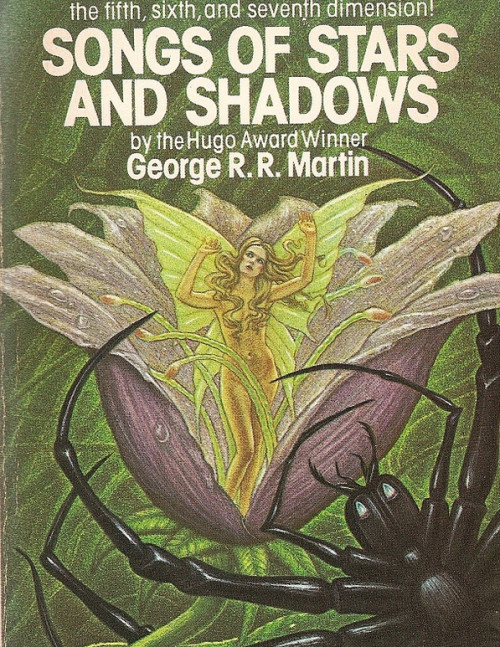Coming Up…
Main Fiction: “Men of Greywater Station” by George R. R. Martin and Howard Waldrop
Originally published Amazing Stories 1976 and Songs of Stars and Shadows
Hugo, Nebula, and World Fantasy Award–winner George R. R. Martin, New York Times bestselling author of the landmark A Song of Ice and Fire fantasy series, has been called “the American Tolkien.”
Born in Bayonne, New Jersey, George R. R. Martin made his first sale in 1971, and soon established himself as one of the most popular SF writers of the seventies. He quickly became a mainstay of the Ben Bova Analog with stories such as “With Morning Comes Mistfall,” “And Seven Times Never Kill Man,” “The Second Kind of Loneliness,” “The Storms of Windhaven” (in collaboration with Lisa Tuttle, and later expanded by them into the novel Windhaven), “Override,” and others, although he also sold to Amazing, Fantastic, Galaxy, Orbit, and other markets. One of his Analog stories, the striking novella “A Song for Lya,” won him his first Hugo Award, in 1974.
By the end of the seventies he had reached the height of his influence as a science fiction writer, and was producing his best work in that category with stories such as the famous “Sandkings,” his best-known story, which won both the Nebula and the Hugo in 1980 (he’d later win another Nebula in 1985 for his story “Portraits of His Children”); “The Way of Cross and Dragon,” which won a Hugo Award in the same year (making Martin the first author ever to receive two Hugo Awards for fiction in the same year): “Bitterblooms”; “The Stone City”; “Starlady”; and others. These stories would be collected in Sandkings, one of the strongest collections of the period. By now he had mostly moved away from Analog, although he would have a long sequence of stories about the droll interstellar adventures of Haviland Tuf (later collected in Tuf Voyaging) running throughout the eighties in the Stanley Schmidt Analog, as well as a few strong individual pieces such as the novella “Nightflyers.” Most of his major work of the late seventies and early eighties, though, would appear in Omni. The late seventies and eighties also saw the publication of his memorable novel Dying of the Light, his only solo SF novel, while his stories were collected in A Song for Lya, Sandkings, Songs of Stars and Shadows, Songs the Dead Men Sing, Nightflyers, and Portraits of His Children. By the beginning of the eighties he’d moved away from SF and into the horror genre, publishing the big horror novel Fevre Dream, and winning the Bram Stoker Award for his horror story “The Pear-Shaped Man” and the World Fantasy Award for his werewolf novella “The Skin Trade.” By the end of that decade, though, the crash of the horror market and the commercial failure of his ambitious horror novel The Armageddon Rag had driven him out of the print world and to a successful career in television instead, where for more than a decade he worked as story editor or producer on such shows as the new Twilight Zone and Beauty and the Beast.
After years away, Martin made a triumphant return to the print world in 1996 with the publication of the immensely successful fantasy novel A Game of Thrones, the start of his Song of Ice and Fire sequence. A freestanding novella taken from that work, “Blood of the Dragon,” won Martin another Hugo Award in 1997. Further books in the Song of Ice and Fire series—A Clash of Kings, A Storm of Swords, A Feast for Crows, and A Dance with Dragons, have made it one of the most popular, acclaimed, and bestselling series in all of modern fantasy. Recently, the books were made into an HBO TV series, Game of Thrones, which has become one of the most popular and acclaimed shows on television, and made Martin a recognizable figure well outside of the usual genre boundaries, even inspiring a satirical version of him on Saturday Night Live. Martin’s most recent books are the latest book in the Ice and Fire series, A Dance with Dragons; a massive retrospective collection spanning the entire spectrum of his career, GRRM: A RRetrospective; a novella collection, Starlady and Fast-Friend; a novel written in collaboration with Gardner Dozois and Daniel Abraham, Hunter’s Run; and, as editor, several anthologies edited in collaboration with Gardner Dozois, including Warriors, Songs of the Dying Earth, Songs of Love and Death, and Down These Strange Streets, and several new volumes in his long-running Wild Cards anthology series, including Suicide Kings and Fort Freak. In 2012, Martin was given the Life Achievement Award by the World Fantasy Convention.
Waldrop’s stories combine elements such as alternate history, American popular culture, the American South, old movies (and character actors), classical mythology, and rock ‘n’ roll music. His style is sometimes obscure or elliptical: Night of the Cooters is a pastiche of H. G. Wells’ The War of the Worlds told from the perspective of a small town Texas sheriff (a homage to Slim Pickens) who finds an off-course Martian cylinder crashing down near his town; “Heirs of the Perisphere” involves robotic Disney characters waking up in the far future; “Fin de Cyclé” describes the Dreyfus affair from the perspective of bicycle enthusiasts.
Waldrop’s work is frequently out-of-print, though still available for sale on-line; several of his books have been reprinted in omnibus editions.
Narrated by: Nick Camm
Nick is an actor, audio-book narrator and voice-overer. He recently did a few scenes on the telly with Derek Jacobi, which made him tingle. He’s just finished shooting the feature film ‘Slapper and Me’, which mostly involved him sitting in a sleazy pub for 12 hours a day smoking herbal cigarettes, drinking tepid, non-alcoholic ale and pretending to be in the 1970’s. He thinks it should be out in the autumn, but they’re not telling him, probably because they don’t want him turning up at the première in his cheap suit.
Audio-bookwise, Nick is currently four books into narrating the mystery/thriller ‘Eddie Malloy Series’, written by Richard Pitman and Joe McNally. Set in the skullduggerous world of horse-racing, reluctant part-time detective Eddie gets involved in various capers and generally solves stuff. It’s the first time in many a year that Nick has read, and enjoyed, a set of novels where spaceships refuse to appear. Notwithstanding, Nick has made a polite suggestion to the authors that shiny, future-type stuff might feature in the next of the series (a Hawking-drive, killer robot horse, perhaps). This has fallen on deaf ears.
If you want him to narrate a book for you, he can be found on Twitter, here: @NickCamm1
Or, if you want him to do some acting for you, here: http://amberltd.co.uk/?client=nicholas-camm
Podcast: Play in new window | Download




 Subscribe Via iTunes
Subscribe Via iTunes Subscribe to RSS feed
Subscribe to RSS feed Like us on Facebook
Like us on Facebook Follow us on Twitter
Follow us on Twitter
Thanks for creating StarShipSofa No 389 George R.
R. Martin | StarShipSofa, actually like it.